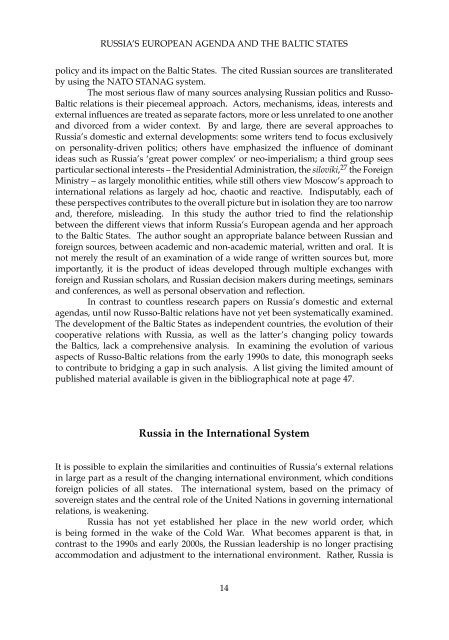Russia's European Agenda and The Baltic States - Defence ...
Russia's European Agenda and The Baltic States - Defence ...
Russia's European Agenda and The Baltic States - Defence ...
You also want an ePaper? Increase the reach of your titles
YUMPU automatically turns print PDFs into web optimized ePapers that Google loves.
RUSSIA’S EUROPEAN AGENDA AND THE BALTIC STATES<br />
policy <strong>and</strong> its impact on the <strong>Baltic</strong> <strong>States</strong>. <strong>The</strong> cited Russian sources are transliterated<br />
by using the NATO Stanag system.<br />
<strong>The</strong> most serious flaw of many sources analysing Russian politics <strong>and</strong> Russo-<br />
<strong>Baltic</strong> relations is their piecemeal approach. Actors, mechanisms, ideas, interests <strong>and</strong><br />
external influences are treated as separate factors, more or less unrelated to one another<br />
<strong>and</strong> divorced from a wider context. By <strong>and</strong> large, there are several approaches to<br />
Russia’s domestic <strong>and</strong> external developments: some writers tend to focus exclusively<br />
on personality-driven politics; others have emphasized the influence of dominant<br />
ideas such as Russia’s ‘great power complex’ or neo-imperialism; a third group sees<br />
particular sectional interests – the Presidential Administration, the siloviki, 27 the Foreign<br />
Ministry – as largely monolithic entities, while still others view Moscow’s approach to<br />
international relations as largely ad hoc, chaotic <strong>and</strong> reactive. Indisputably, each of<br />
these perspectives contributes to the overall picture but in isolation they are too narrow<br />
<strong>and</strong>, therefore, misleading. In this study the author tried to find the relationship<br />
between the different views that inform Russia’s <strong>European</strong> agenda <strong>and</strong> her approach<br />
to the <strong>Baltic</strong> <strong>States</strong>. <strong>The</strong> author sought an appropriate balance between Russian <strong>and</strong><br />
foreign sources, between academic <strong>and</strong> non-academic material, written <strong>and</strong> oral. It is<br />
not merely the result of an examination of a wide range of written sources but, more<br />
importantly, it is the product of ideas developed through multiple exchanges with<br />
foreign <strong>and</strong> Russian scholars, <strong>and</strong> Russian decision makers during meetings, seminars<br />
<strong>and</strong> conferences, as well as personal observation <strong>and</strong> reflection.<br />
In contrast to countless research papers on Russia’s domestic <strong>and</strong> external<br />
agendas, until now Russo-<strong>Baltic</strong> relations have not yet been systematically examined.<br />
<strong>The</strong> development of the <strong>Baltic</strong> <strong>States</strong> as independent countries, the evolution of their<br />
cooperative relations with Russia, as well as the latter’s changing policy towards<br />
the <strong>Baltic</strong>s, lack a comprehensive analysis. In examining the evolution of various<br />
aspects of Russo-<strong>Baltic</strong> relations from the early 1990s to date, this monograph seeks<br />
to contribute to bridging a gap in such analysis. A list giving the limited amount of<br />
published material available is given in the bibliographical note at page 47.<br />
Russia in the International System<br />
It is possible to explain the similarities <strong>and</strong> continuities of Russia’s external relations<br />
in large part as a result of the changing international environment, which conditions<br />
foreign policies of all states. <strong>The</strong> international system, based on the primacy of<br />
sovereign states <strong>and</strong> the central role of the United Nations in governing international<br />
relations, is weakening.<br />
Russia has not yet established her place in the new world order, which<br />
is being formed in the wake of the Cold War. What becomes apparent is that, in<br />
contrast to the 1990s <strong>and</strong> early 2000s, the Russian leadership is no longer practising<br />
accommodation <strong>and</strong> adjustment to the international environment. Rather, Russia is<br />
14

















